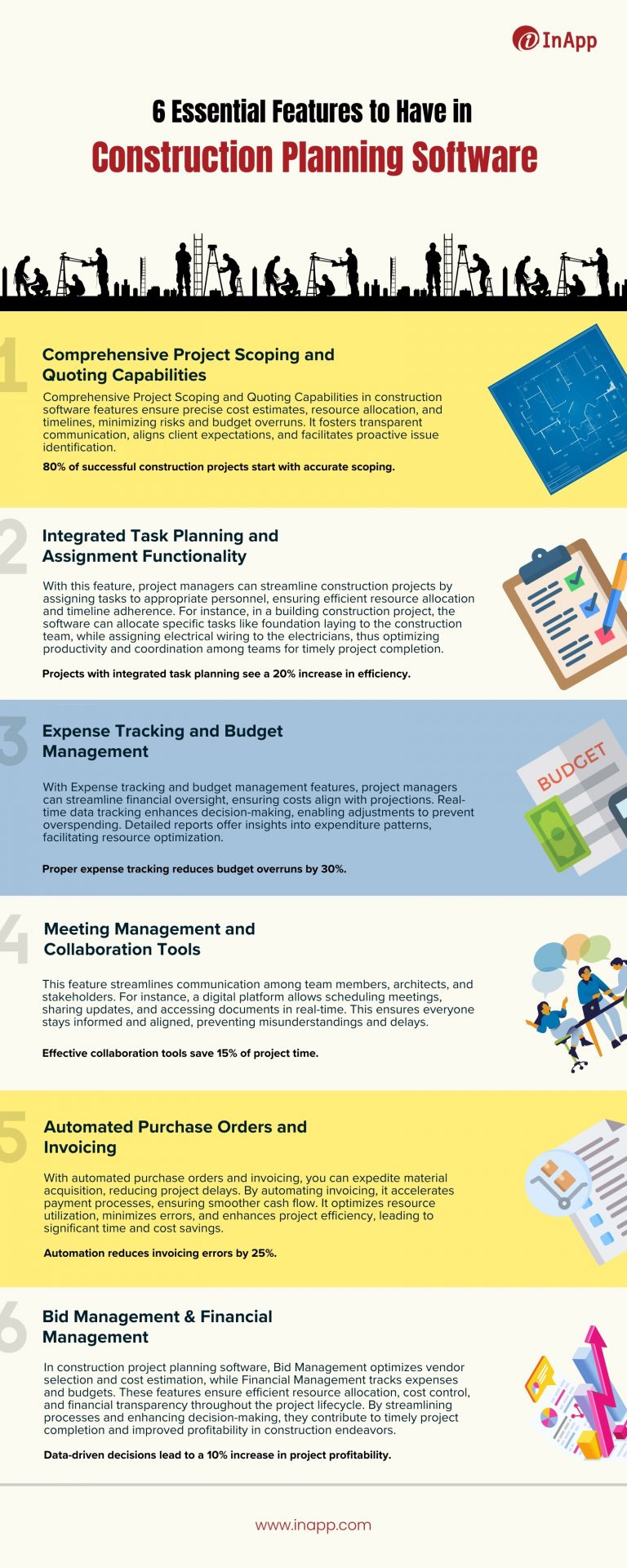In the construction industry, every day brings its own set of challenges. From scoping projects to creating quotes, planning tasks, tracking expenses, and managing meetings, the role of a construction manager is nothing short of a juggling act.
Enter construction planning software—a game-changer for busy construction professionals. Construction planning software streamlines workflows centralizes data, and simplifies the entire project management process. But with many options available in the market, choosing the right software can be daunting.
This blog will explore six indispensable features that your construction planning software must have. So, let’s dive in and see how you can up your construction management game with the right software solution.
What Is a Construction Planning Software?
As the name suggests, construction planning software is a digital tool designed to streamline and optimize the management of construction projects. It serves as a centralized platform for planning, organizing, and executing various project tasks, from initial scoping and quoting to task assignment, expense tracking, and invoicing.
With features such as Gantt charts, task lists, and resource allocation tools, construction planning software enables managers to create detailed project schedules, allocate tasks to team members, and monitor progress in real-time. Additionally, advanced reporting and analytics capabilities provide managers with actionable insights into project performance, allowing them to make data-driven decisions and optimize project outcomes.
Moreover, integrated collaboration tools facilitate seamless communication and collaboration among project stakeholders, fostering teamwork and transparency. By automating processes such as purchase orders and invoicing, construction planning software helps managers maintain financial discipline, control costs, and maximize profitability.
Features to Look For in Construction Planning Software
1. Comprehensive Project Scoping and Quoting Capabilities
Before embarking on any construction project, thorough scoping and accurate quoting are essential to set the groundwork for success. Construction planning software equipped with robust scoping and quoting features helps managers create detailed project plans, accurately estimate costs, and generate comprehensive quotes for clients. From defining project objectives and deliverables to assessing resource requirements and potential risks, this feature enables managers to lay a solid foundation for project execution.
Moreover, advanced quoting tools within the software will aid in the creation of precise cost estimates by incorporating factors such as material costs, labor expenses, equipment rentals, and overhead expenses.
2. Integrated Task Planning and Assignment Functionality
Efficient task planning and assignment are vital components of effective construction project management. With integrated task planning and assignment functionality, managers can create detailed project schedules, allocate tasks to team members, and monitor progress in real-time. With intuitive Gantt charts, task lists, and resource allocation tools, managers can visualize project timelines, identify dependencies, and allocate resources efficiently.
Additionally, the ability to assign tasks directly within the software fosters collaboration and accountability among team members. By providing a centralized platform for task management, the software can enhance communication, minimize delays, and ensure that projects stay on track.
3. Expense Tracking and Budget Management
Effective expense tracking and budget management are critical for controlling costs and maximizing profitability in construction projects. Construction planning software equipped with seamless expense tracking features enables managers to monitor project expenses, track purchases, and manage budgets with precision. By capturing expenses in real-time and categorizing them according to project phases or cost codes, this feature provides managers with invaluable insights into project financials.
Furthermore, advanced budget management tools within the software allow managers to set budgetary constraints, track expenditures against allocated budgets, and generate detailed financial reports. With the ability to identify cost overruns, anticipate potential budgetary issues, and make informed decisions, managers can maintain financial discipline and optimize project profitability.
4. Meeting Management and Collaboration Tools
Effective communication and collaboration are essential for driving project success in the construction industry. From scheduling and organizing meetings to sharing documents, recording minutes, and assigning action items, having meeting management & collaboration tools will help managers conduct productive meetings and ensure that key project decisions are documented and implemented.
Moreover, integrated collaboration tools such as discussion forums, file sharing, and instant messaging can improve team collaboration, foster transparency, and facilitate knowledge sharing among team members.
5. Automated Purchase Orders and Invoicing
Streamlining procurement processes and managing invoicing are integral aspects of construction project management. Construction planning software that offers automated purchase order and invoicing functionality can simplify these tasks, reduce manual errors, and accelerate payment cycles. By automating the creation and tracking of purchase orders, managers can streamline procurement processes, maintain accurate records of purchases, and ensure compliance with budgetary constraints and project timelines.
6. Bid Management & Financial Management
Robust reporting and analytics in construction planning software provide vital insights into project progress and performance. It helps managers track resource utilization, identify trends, and make data-driven decisions. By offering customizable dashboards and real-time analytics, managers can optimize project outcomes and mitigate risks effectively.
Apart from this, access to comprehensive reports and key performance indicators (KPIs) enables managers to evaluate project performance, identify areas for improvement, and drive continuous progress across projects. In a fast-paced industry like construction, having access to actionable insights is essential for staying ahead and delivering successful projects.
Construction Planning Software – A Necessity for the Industry
In conclusion, the adoption of construction planning software is imperative for the modern construction industry. With its ability to streamline workflows, enhance collaboration, and optimize project management processes, construction planning software offers a competitive edge in today’s fast-paced construction landscape.
However, recognizing that every construction project comes with its unique requirements, the need for customized solutions may arise. Tailored construction planning software can address specific business needs and further enhance efficiency and productivity. If you have custom requirements or need additional features, don’t hesitate to get in touch with us.

